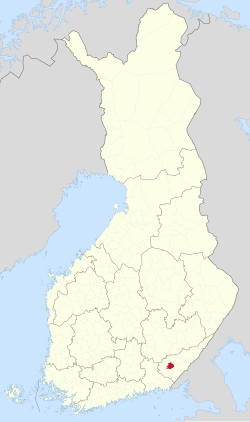Lemi
Lemi | |
|---|---|
Municipality | |
| Lemin kunta Lemi kommun | |
 The center of Lemi | |
 Location of Lemi in Finland | |
| Coordinates: 61°03.7′N 027°48.3′E / 61.0617°N 27.8050°E | |
| Country | |
| Region | South Karelia |
| Sub-region | Lappeenranta sub-region |
| Charter | 1688 |
| Municipality | 1867 |
| Government | |
| • Municipal manager | Simo Luukkanen |
| Area (2018-01-01)[1] | |
• Total | 262.48 km2 (101.34 sq mi) |
| • Land | 217.96 km2 (84.15 sq mi) |
| • Water | 44.71 km2 (17.26 sq mi) |
| • Rank | 255th largest in Finland |
| Population (2024-10-31)[2] | |
• Total | 2,853 |
| • Rank | 221st largest in Finland |
| • Density | 13.09/km2 (33.9/sq mi) |
| Population by native language | |
| • Finnish | 97.4% (official) |
| • Swedish | 0.1% |
| • Others | 2.4% |
| Population by age | |
| • 0 to 14 | 17.3% |
| • 15 to 64 | 56.8% |
| • 65 or older | 25.8% |
| Time zone | UTC+02:00 (EET) |
| • Summer (DST) | UTC+03:00 (EEST) |
| Climate | Dfc |
| Website | www.lemi.fi |
Lemi is a municipality of Finland. It is located in the South Karelia region. The municipality has a population of 2,853 (31 October 2024),[2] which make it the smallest municipality in South Karelia in terms of population. It covers an area of 262.48 square kilometres (101.34 sq mi) of which 44.71 km2 (17.26 sq mi) is water.[1] The population density is 13.09 inhabitants per square kilometre (33.9/sq mi).
The municipality is unilingually Finnish. The Finnish thrash metal band Stam1na is from Lemi. In 2018 Lemi won the title "heavy metal capital of the world," a title that was determined by number of bands per capita. Lemi had 13 recognised bands. Due to Lemi only having just 3,076 inhabitants at the time, it won with a ratio of 422.6 bands per 100,000 inhabitants.
Geography
[edit]The municipal center of Lemi is Juvola. The other villages are Ahtiala, Hakulila, Heikkilä, Huttula, Hyvärilä, Iitiä, Juuresaho (prev. Remunen), Juvola, Kaamanniemi, Kuukanniemi, Kapiala, Keskisenpää, Korpela, Kurkela, Kärmeniemi, Laakkola, Lavola, Merenlahti, Metsola, Mikkola, Mikonharju, Nisola, Nuppola, Olkkonen, Parkkola, Pöllölä, Ruohiala, Ruomi, Sairala, Sorvarila, Suomalainen, Suoniala, Suontakainen, Sutela, Taipale, Tevaniemi, Torvenniemi, Tuomelanpelto (partly belongs to Iitiä), Uiminniemi, Urola, Vainikkala, Välikangas and Värtölä.
The schools are in Juvola and Kuukanniemi. There are about 750 inhabitants in Kuukanniemi and the villages it affects.
History
[edit]Independence
[edit]Lemi has been founded in 1688 as an independent Evangelical Lutheran parish. Due to the secularization of the local governments according to the decree of 1865, the secular local government was separated from the clerical in 1867 as the municipality of Lemi.
War time
[edit]
Some fighting took place in the cemetery of Lemi during the civil war in 1918. After the winter war as the military hardware had to be displaced from the territories to be given to the Soviet Union on the basis of the Moscow Armistice, naval artillery was brought to Lemi to create part of the Salpa Line. From the Käkisalmi region the Vahtiniemi battery was transferred to Kärmeniemi consisting of two Canet 152/45-C naval guns. Later, on 11 July 1941, they were taken to Antamoinen to be tested on 22 July. Four days later they were transported by train from Lappeenranta again near Käkisalmi to Vahtiniemi to become operational 9 September 1941. After the Continuation War the 32nd heavy battery brought only one of the two Canet 152/45-C's it had as the other was to repaired. By the end of November 1944 the 32nd heavy battery was dissolved and the guns were sent to Parola.[5]
After the war there has not been naval guns in Lemi, but the remaining positions can be seen both in Kärmeniemi and Juvola.
Attractions
[edit]| Name | Place | Description | WGS 84 |
|---|---|---|---|
| The Evangelical Lutheran Church of Lemi | |||
| Juvolan mörssäripatteri – The mortar battery of Juvola | Juvola | The partly restored position of four positions of the 280 mm mortar of the year 1877. The four mortars are destroyed after the Continuation War.[6] The battery has been a part of the Salpa Line | |
| Kärmeniemen patteri – The battery of Kärmeniemi | Juvola | The position of two Canet 152/45 C guns. The guns are displaced [7] The battery has been a part of the Salpa Line |
-
Lemi church
-
Bell tower in Lemi's center
Notable individuals
[edit]- Elias Muukka, painter[citation needed]
- Mirja Hietamies, Olympic champion cross-country skier[citation needed]
- Stam1na, thrash metal band[citation needed]
References
[edit]- ^ a b "Area of Finnish Municipalities 1.1.2018" (PDF). National Land Survey of Finland. Retrieved 30 January 2018.
- ^ a b c "Finland's preliminary population figure was 5,635,560 at the end of October 2024". Population structure. Statistics Finland. 19 November 2024. ISSN 1797-5395. Retrieved 22 November 2024.
- ^ "Population according to age (1-year) and sex by area and the regional division of each statistical reference year, 2003–2020". StatFin. Statistics Finland. Retrieved 2 May 2021.
- ^ a b "Luettelo kuntien ja seurakuntien tuloveroprosenteista vuonna 2023". Tax Administration of Finland. 14 November 2022. Retrieved 7 May 2023.
- ^ "27. SALPALINJA / KÄRMENIEMEN PATTERI". lemi.fi. Archived from the original on 20 July 2011. Retrieved 6 April 2012.
- ^ "39. Juvolan patteri". lemi.fi. Archived from the original on 28 September 2013. Retrieved 6 April 2012.
- ^ "27. SALPALINJA / KÄRMENIEMEN PATTERI". lemi.fi. Archived from the original on 20 July 2011. Retrieved 6 April 2012.
External links
[edit]![]() Media related to Lemi at Wikimedia Commons
Media related to Lemi at Wikimedia Commons
![]() Lemi travel guide from Wikivoyage
Lemi travel guide from Wikivoyage
- Municipality of Lemi – Official website
- goSaimaa.com – travel information




